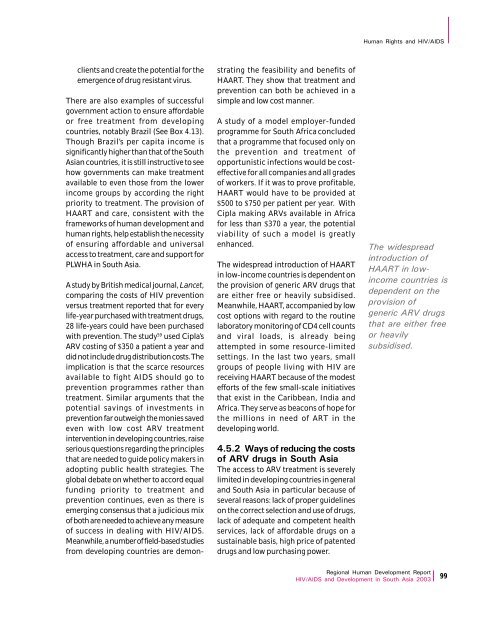Download Report - UNDP Asia-Pacific Regional Centre - United ...
Download Report - UNDP Asia-Pacific Regional Centre - United ...
Download Report - UNDP Asia-Pacific Regional Centre - United ...
You also want an ePaper? Increase the reach of your titles
YUMPU automatically turns print PDFs into web optimized ePapers that Google loves.
Human Rights and HIV/AIDSclients and create the potential for theemergence of drug resistant virus.There are also examples of successfulgovernment action to ensure affordableor free treatment from developingcountries, notably Brazil (See Box 4.13).Though Brazil’s per capita income issignificantly higher than that of the South<strong>Asia</strong>n countries, it is still instructive to seehow governments can make treatmentavailable to even those from the lowerincome groups by according the rightpriority to treatment. The provision ofHAART and care, consistent with theframeworks of human development andhuman rights, help establish the necessityof ensuring affordable and universalaccess to treatment, care and support forPLWHA in South <strong>Asia</strong>.A study by British medical journal, Lancet,comparing the costs of HIV preventionversus treatment reported that for everylife-year purchased with treatment drugs,28 life-years could have been purchasedwith prevention. The study 59 used Cipla’sARV costing of $350 a patient a year anddid not include drug distribution costs. Theimplication is that the scarce resourcesavailable to fight AIDS should go toprevention programmes rather thantreatment. Similar arguments that thepotential savings of investments inprevention far outweigh the monies savedeven with low cost ARV treatmentintervention in developing countries, raiseserious questions regarding the principlesthat are needed to guide policy makers inadopting public health strategies. Theglobal debate on whether to accord equalfunding priority to treatment andprevention continues, even as there isemerging consensus that a judicious mixof both are needed to achieve any measureof success in dealing with HIV/AIDS.Meanwhile, a number of field-based studiesfrom developing countries are demonstratingthe feasibility and benefits ofHAART. They show that treatment andprevention can both be achieved in asimple and low cost manner.A study of a model employer-fundedprogramme for South Africa concludedthat a programme that focused only onthe prevention and treatment ofopportunistic infections would be costeffectivefor all companies and all gradesof workers. If it was to prove profitable,HAART would have to be provided at$500 to $750 per patient per year. WithCipla making ARVs available in Africafor less than $370 a year, the potentialviability of such a model is greatlyenhanced.The widespread introduction of HAARTin low-income countries is dependent onthe provision of generic ARV drugs thatare either free or heavily subsidised.Meanwhile, HAART, accompanied by lowcost options with regard to the routinelaboratory monitoring of CD4 cell countsand viral loads, is already beingattempted in some resource-limitedsettings. In the last two years, smallgroups of people living with HIV arereceiving HAART because of the modestefforts of the few small-scale initiativesthat exist in the Caribbean, India andAfrica. They serve as beacons of hope forthe millions in need of ART in thedeveloping world.4.5.2 Ways of reducing the costsof ARV drugs in South <strong>Asia</strong>The access to ARV treatment is severelylimited in developing countries in generaland South <strong>Asia</strong> in particular because ofseveral reasons: lack of proper guidelineson the correct selection and use of drugs,lack of adequate and competent healthservices, lack of affordable drugs on asustainable basis, high price of patenteddrugs and low purchasing power.The widespreadintroduction ofHAART in lowincomecountries isdependent on theprovision ofgeneric ARV drugsthat are either freeor heavilysubsidised.<strong>Regional</strong> Human Development <strong>Report</strong>HIV/AIDS and Development in South <strong>Asia</strong> 2003 99
















